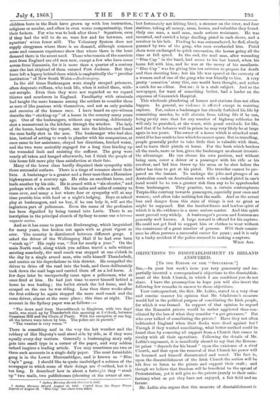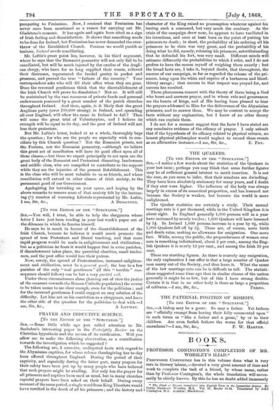OBJECTIONS TO DISESTAI3LISHMENT IN IRELAND ANSWERED.
[To TIIE EDITOR OF TIIE SPECTATOR-1 SIR,—In your last week's issue you very generously and im- partially inserted a correspondent's objections to the disestablish- ment of the Irish Church, in which I am confident you do not share. I have the presumption to hope you will also insert the following few remarks in answer to those objections.
Your correspondent, the Rev. Mr. Lof tie, stated in a very clear
and concise manner his opinion that Mr. Gladstone's measure would fail in the political purpose of conciliating the Irish people, for which it was framed. In support of that opinion he argued that the Romanist priests would be rather aggrieved than con- ciliated by the loss of what they consider "a pet grievance." But who ever talked of conciliating the priests ? Have they not often befriended England when their flocks were dead against her? Though if they wanted conciliating, what better method could be found than by removing all support from a Church that comes in rivalry with all their operations. Following the details of Mr. Lof tie's argument, it is manifestly absurd to say that the Roman- ist priest "depends for his bread" upon the existence of a rival Church, and that upon the removal of that Church his power will be lessened and himself discontented and vexed. The fact is, upon the disestablishment of the Irish Church the nation will be left free to listen to the priests and support their craft ; and though we believe that freedom will be beneficial to the spread of Protestantism, yet it will give to the priests (surely to their satis- faction) what as yet they have not enjoyed, a fair field and no favour.
Mr. Loftie also argues that this measure of disestablishment is pampering to Fenianism. Now, I contend that Fenianism has never once been mentioned as a reason for carrying out Mr.
Gladstone's measure. It has again and again been cited as a sign of Irish feeling and dissatisfaction. It shows that something needs
to be done for Ireland, but Feuianism has never demanded the over- throw of the Established Church. Fenians we would punish as traitors, Ireland needs conciliating.
Mr. Loftie's great point lies, however, in his third argument, where he says that the Romanist peasantry will not only fail to be conciliated, but will be much injured by the exodus of the Angli- can clergy, who have for so long supplied their wants, relieved their distresses, represented the landed gentry in pocket and presence, and proved the true "fathers of the country." Your correspondent asks who will fill their office when they are gone. Does the reverend gentleman think that the disestablishment of the Irish Church will prove its dissolution ? Not so. It will still be maintained by the vast resources of private funds and personal endowments possessed by a great number of the parish churches throughout Ireland. And then, again, is it likely that the great Anglican party (over 700,000 strong) in Ireland, and spreading all over England, will allow the cause in Ireland to fail ? Then will come the great trial of Voluntaryism, and I believe its strength will be equal to its day, and the poor of Ireland will not lose their protectors.
But Mr. Loftie's letter, looked at as a whole, thoroughly begs the question ; for who are the people we especially wish to con- ciliate by this Church question ? Not the Romanist priests, not the Fenians, not the Romanist peasantry,—although we believe this great act of conciliation will have its good effect upon all of those classes,—but those we expect principally to act upon are the great body of the Romanist and Protestant dissenting landowners and middle class, who are compelled to contribute to the support
while they see the injustice of the present Establishment. This is the elms who will be most valuable to us as friends, and whose conciliation will extend to other classes of Irish society, to the permanent good of our Government.
Apologizing for intruding on your space, and hoping by the above remarks to remove some of that anxiety felt by the increas- ing (?) number of wavering Liberals represented by Mr. Loftie,































 Previous page
Previous page